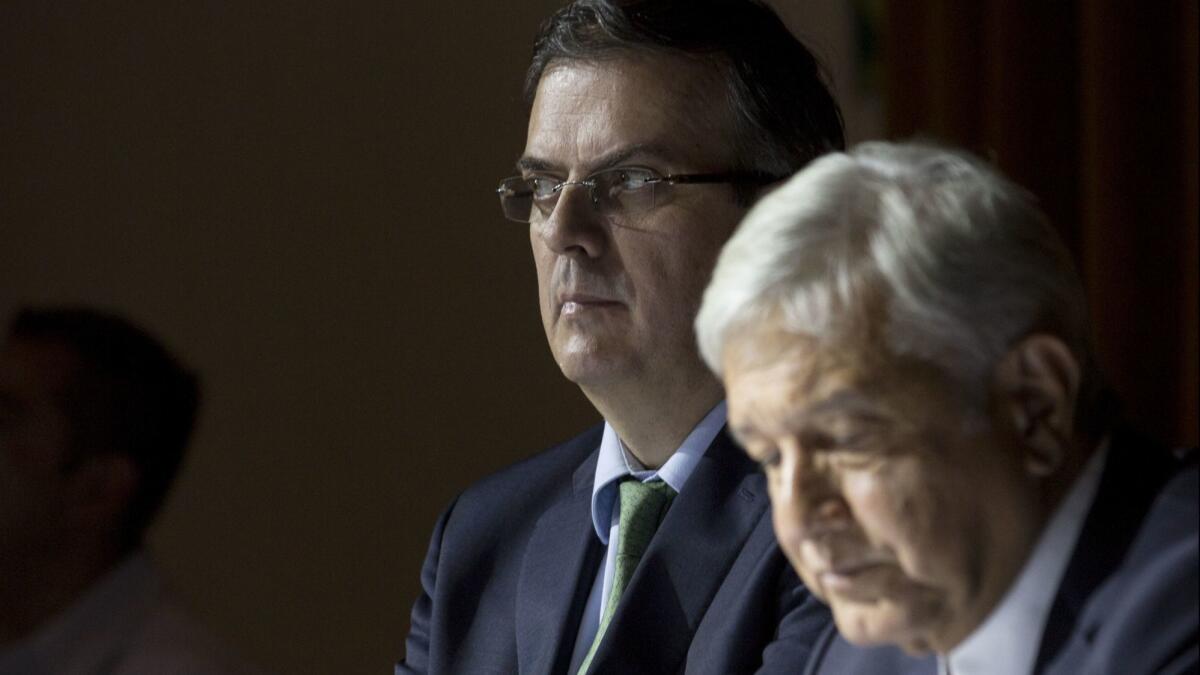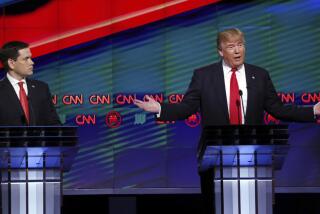Mexico’s Lopez Obrador taps longtime loyalist as nominee for top diplomat and invites Trump to inauguration

Reporting from Mexico City — Mexico’s newly elected president on Thursday named a longtime loyalist and former mayor of Mexico City as his nominee for foreign secretary.
Andres Manuel Lopez Obrador, voted in Sunday as Mexico’s next president in a landslide, also said he planned to invite both President Trump and Canadian Prime Minister Justin Trudeau to his inauguration.
Observers said that inaugural invites were routinely sent to leaders of neighboring nations as a matter of protocol and that there was nothing out of the ordinary about the move. There was no immediate indication that Trump or Trudeau would attend Lopez Obrador’s formal ascension to the presidency on Dec. 1.
The three nations — the United States, Mexico and Canada — are currently involved in a sometimes-contentious renegotiation of the North American Free Trade Agreement, the almost quarter-century-old pact that governs much of the continent’s commerce.
Trump has repeatedly denounced NAFTA as a “horrible” deal for the U.S. economy. Washington is seeking more favorable trade terms, but Mexico and Canada have balked at some of the Trump administration’s proposals.
In a news conference in Mexico City, Lopez Obrador said a trusted advisor, Marcelo Ebrard, would be his choice for the post of foreign secretary.
Like Lopez Obrador, Ebrard is among a generation of left-leaning politicians who broke with Mexico’s long-dominant Institutional Revolutionary Party in the 1980s and 1990s.
Ebrard, 58, a former deputy foreign secretary, thus becomes a key figure in U.S.-Mexico relations and in the ongoing talks to reshape the regional trade regimen. He will also handle preparations for Lopez Obrador’s scheduled meeting with U.S. Secretary of State Michael R. Pompeo, who is to visit Mexico City on July 13.
“We are neighbors, we have economic and commercial relations, links of friendship,” Lopez Obrador said Thursday of Mexico’s relationship with the United States. “Cooperation with the United States is very important to our progress.”
Traditionally close relations between Mexico City and Washington have undergone considerable turbulence of late. Trump has accused Mexico of running up U.S. trade deficits and not doing enough to stem U.S.-bound illegal immigration and drug trafficking.
Mexico has pushed back and pointed out that it has cooperated with U.S. authorities on a wide range of security and other issues and that binational trade helps sustain millions of U.S. jobs. Mexico City has also denounced as “inhumane” the now-scrapped Trump administration policy of separating immigrant families detained on the U.S. side of the border.
Mexico’s current president, Enrique Peña Nieto, twice called off plans to visit Washington and meet with Trump amid ill will about Trump’s insistence that Mexico pay for the administration’s planned wall along the U.S.-Mexico border. All major Mexican political parties condemned Trump’s demand that Mexico pick up the tab for the wall.
But Trump and Mexico’s newly elected president — a longtime leftist — appear to have begun their relationship on amicable terms, despite clear differences in the two men’s political outlooks.
Trump quickly congratulated Lopez Obrador after his electoral triumph Sunday. The two men subsequently spoke by telephone in what both termed a cordial and respectful conversation.
Still, many observers here expect that Lopez Obrador, who embodies a robust nationalist tradition, will be less accommodating to U.S. interests than some of his predecessors.
Since his election, however, Lopez Obrador has gone out of his way to strike a conciliatory tone and discourage speculation that his government would act in a precipitous manner.
He has stressed fiscal discipline and respect for financial institutions and investments and said he hoped for a mutually beneficial relationship with Washington.
The comments appear to have mollified investors and others who opposed Lopez Obrador’s candidacy and were wary of his sometimes-strident populist rhetoric.
Fears of an economic collapse after Lopez Obrador’s election appear to have abated. The Mexican peso has held its own on international markets, even surging since the election to a rate of slightly more than 19 to the dollar, up from about 20 before the vote.
Ebrard will probably face little opposition when his nomination comes before the Mexican Senate.
Along with its landslide win, Lopez Obrador’s National Regeneration Movement, known as Morena, also appeared headed for big majorities in both houses of the Mexican Congress after Sunday’s national balloting.
Slated to head the foreign relations committee of the new Mexican Senate is another Lopez Obrador ally, Hector Vasconcelos, a longtime diplomat who was initially seen as a likely foreign secretary. But Lopez Obrador said that Vasconcelos would assume his seat in the Senate.
The three men — Lopez Obrador, Ebrard and Vasconcelos — left the scene of Thursday’s news conference in a white Volkswagen sedan with little police presence. The president-elect tends to minimize pomp and has promised to reduce official expenses.
Lopez Obrado told the media this week that he would eschew use of government aircraft, not live in the presidential mansion and earn half the salary of the current president. Said the president-elect: “We cannot have a rich government and a poor people.”
Lopez Obrador has vowed to cut government waste, slash official salaries and attack corruption as a means of funding his ambitious social agenda. His campaign planks included increased pensions for the elderly and disabled and additional scholarships for students.
Times staff writer Tracy Wilkinson in Washington and Cecilia Sanchez of The Times’ Mexico City bureau contributed to this report.
Twitter: @PmcdonnellLAT
More to Read
Sign up for Essential California
The most important California stories and recommendations in your inbox every morning.
You may occasionally receive promotional content from the Los Angeles Times.










